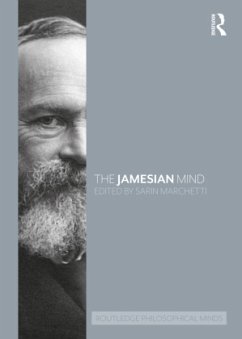William James (1842-1910) is widely regarded as the founding figure of modern psychology and one of the most important philosophers of the nineteenth and twentieth centuries. Renowned for his philosophical theory of pragmatism and memorable turns of phrase, such as 'stream of consciousness' and the 'will to believe', he made enormous contributions to a rich array of philosophical subjects, from the emotions and free will to religion, ethics, and the meaning of life.
The Jamesian Mind covers the major aspects of James's thought, from his early influences to his legacy, with over forty chapters by an outstanding roster of international contributors. It is organized into seven parts:
Intellectual Biography Psychology, Mind, and Self Ethics, Religion, and Politics Method, Truth, and Knowledge Philosophical Encounters Legacy.
In these sections fundamental topics are examined, including James's conceptions of philosophical and scientific inquiry, habit, self, free will and determinism, pragmatism, truth, and pluralism. Considerable attention is also devoted to James in relation to the intellectual traditions of empiricism and Romanticism as well as to such other philosophical schools as utilitarianism, British idealism, Logical Empiricism, and existentialism. James's thought is also situated in an interdisciplinary context, including modernism, sociology, and politics, showcasing his legacy in psychology and ethics.
An indispensable resource for anyone studying and researching James's philosophy, The Jamesian Mind will also interest those in related disciplines such as psychology, religion, and sociology.
The Jamesian Mind covers the major aspects of James's thought, from his early influences to his legacy, with over forty chapters by an outstanding roster of international contributors. It is organized into seven parts:
Intellectual Biography Psychology, Mind, and Self Ethics, Religion, and Politics Method, Truth, and Knowledge Philosophical Encounters Legacy.
In these sections fundamental topics are examined, including James's conceptions of philosophical and scientific inquiry, habit, self, free will and determinism, pragmatism, truth, and pluralism. Considerable attention is also devoted to James in relation to the intellectual traditions of empiricism and Romanticism as well as to such other philosophical schools as utilitarianism, British idealism, Logical Empiricism, and existentialism. James's thought is also situated in an interdisciplinary context, including modernism, sociology, and politics, showcasing his legacy in psychology and ethics.
An indispensable resource for anyone studying and researching James's philosophy, The Jamesian Mind will also interest those in related disciplines such as psychology, religion, and sociology.
"Pluralism was an essential part of William James's philosophical perspective, and the essays in this volume wonderfully live up to this ideal. They range widely, and expertly, over his psychology, philosophy, social theory, and life. Few stones are left unturned. Readers, both new and well-acquainted with James, will delight in this volume's breadth and depth." - George B. Cotkin, California Polytechnic State University, USA
"Pluralism was an essential part of William James's philosophical perspective, and the essays in this volume wonderfully live up to this ideal. They range widely, and expertly, over his psychology, philosophy, social theory, and life. Few stones are left unturned. Readers, both new and well-acquainted with James, will delight in this volume's breadth and depth." - George B. Cotkin, California Polytechnic State University, USA








